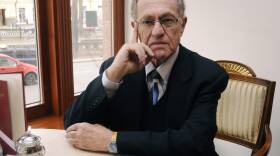-
Alan Dershowitz Discusses President Trump's Acquittal, Defends His Role On Legal Team
Dershowitz argued for Trump during his Senate impeachment trial -
Sen. Romney Breaks With GOP, Votes To Convict Trump
Republican Mitt Romney took the Senate's most brazenly rebellious stance Wednesday in voting to force President Donald Trump from office. -
Trump Delivers State Of The Union As Impeachment Vote Looms. So Did Clinton
The State of the Union gets massive television ratings. This year, President Trump will deliver it a day before senators vote on whether to remove him from office. -
Impeachment Trial Heads Toward Finish Line After Witness Vote Fails
The key vote of the trial occurred Friday, when the Senate voted not to include new witness testimony as part of the impeachment trial of President Trump. -
Former Ambassador Marie Yovanovitch, Key Figure In Impeachment Trial, Retires
The career diplomat, who served as ambassador to Ukraine, became a key figure in the impeachment of President Trump, was forced out of her post in May. -
Senate Rejects Efforts To Call Witnesses In Impeachment Trial
The move to cut off witness testimony is likely to lead to a speedy acquittal for the president. -
Sen. Alexander Explains Decision Not To Call Witnesses In Trump Impeachment Trial
The retiring Senate Republican says there is no need for more evidence, although he says Democratic House managers proved wrongdoing. -
Decades Ago, Dershowitz Said Congress' Impeachment Power Would Trump Executive Privilege
In the early 1970s, as the House was considering impeachment proceedings against then-President Richard Nixon, Dershowitz suggested impeachment was a check on executive authority. -
McConnell Now Likely Has Votes To Block Witnesses; Trial Could End Soon
Sen. Lamar Alexander says he will not vote to bring witnesses. The Senate could move swiftly Friday to end President Trump's impeachment trial. -
Cabral: Dershowitz Is 'A Harvard Professor Making A Trump University Argument'
On Wednesday, Dershowitz said that advanced a controversial legal theory in which he claimed a president could invite electoral interference from a foreign power to aid them because it would be in the public interest.








